I’ve never considered myself much of a reader. Well, I know how to read. What I mean is I never used to find reading all that enjoyable or relaxing. Somewhere along the way, that’s started to change. I certainly don’t read as much as some people, but I do find myself wanting to read more and more. I think much of it has to do with wanting to learn more about topics of interest, which probably explains the high percentage of non-fiction in my reading list. I recently looked through the list of books I’ve read in the past year, and wanted to capture some thoughts about them.
 Most recently, I re-read Shusaku Endo’s Silence. Set is 16th century Japan, it is a novel about missionaries struggling with the persecution of Christians by the Japanese ruling class. Specifically, they cannot comprehend God’s silence in the midst of the persecution. “I know well, of course, that the greatest sin against God was despair; but the silence of God was something I could not fathom.” It was a challenging read, causing me to question how I would respond in such a situation. On a lighter note, did anyone else picture Gollum whenever Kichijiro’s character was described? Many similarities, I thought.
Most recently, I re-read Shusaku Endo’s Silence. Set is 16th century Japan, it is a novel about missionaries struggling with the persecution of Christians by the Japanese ruling class. Specifically, they cannot comprehend God’s silence in the midst of the persecution. “I know well, of course, that the greatest sin against God was despair; but the silence of God was something I could not fathom.” It was a challenging read, causing me to question how I would respond in such a situation. On a lighter note, did anyone else picture Gollum whenever Kichijiro’s character was described? Many similarities, I thought.
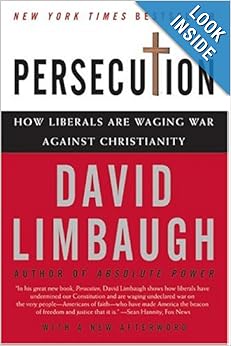 Speaking of persecution (though of a much different nature), I read David Limbaugh’s Persecution: How Liberals are Waging War Against Christianity (personally signed, no less). Being a lawyer, Limbaugh is very methodical in documenting case after case of the Christian faith being pushed further from both the public and private lives of Americans, at a time when tolerance is often viewed as the highest cultural virtue.
Speaking of persecution (though of a much different nature), I read David Limbaugh’s Persecution: How Liberals are Waging War Against Christianity (personally signed, no less). Being a lawyer, Limbaugh is very methodical in documenting case after case of the Christian faith being pushed further from both the public and private lives of Americans, at a time when tolerance is often viewed as the highest cultural virtue.
 Along those same lines, Alan Sears and Craig Osten combined efforts to write The ACLU vs. America. I didn’t intentionally read this one in proximity to Limbaugh’s book, but there was great similarity in their themes. What amazed me about this book was not only the documented cases of the ACLU trying to undermine much of what’s made this country great (e.g., capitalism, faith), but their overt admission of having such intentions.
Along those same lines, Alan Sears and Craig Osten combined efforts to write The ACLU vs. America. I didn’t intentionally read this one in proximity to Limbaugh’s book, but there was great similarity in their themes. What amazed me about this book was not only the documented cases of the ACLU trying to undermine much of what’s made this country great (e.g., capitalism, faith), but their overt admission of having such intentions.
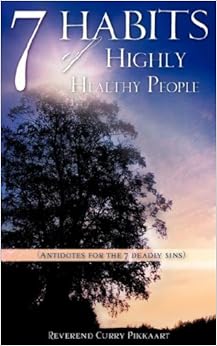 On more of a devotional and spiritual front, I was encouraged and challenged by several books. The first was 7 Habits of Highly Healthy People (Antidotes for the 7 Deadly Sins), by Rev. Curry Pikkaart. While I didn’t get an advance copy, I can boast receiving a signed copy from the first printing. It’s only fair, given the indirect reference to yours truly in the opening paragraphs. As the book cover lays out, “Since the object of our focus is what most frequently influences us, it is important to focus on the development of the habits that produce the 7 virtues.” It’s with that mindset that the book goes through the personal challenges of doing good works, practicing contentment, applying the golden rule, feeding hunger, aiming for simplicity, guarding your mind, and learning to restrain yourself. Given the style of the book and its Biblical grounding, it could easily serve as a devotional study that will bring different things to light with each reading.
On more of a devotional and spiritual front, I was encouraged and challenged by several books. The first was 7 Habits of Highly Healthy People (Antidotes for the 7 Deadly Sins), by Rev. Curry Pikkaart. While I didn’t get an advance copy, I can boast receiving a signed copy from the first printing. It’s only fair, given the indirect reference to yours truly in the opening paragraphs. As the book cover lays out, “Since the object of our focus is what most frequently influences us, it is important to focus on the development of the habits that produce the 7 virtues.” It’s with that mindset that the book goes through the personal challenges of doing good works, practicing contentment, applying the golden rule, feeding hunger, aiming for simplicity, guarding your mind, and learning to restrain yourself. Given the style of the book and its Biblical grounding, it could easily serve as a devotional study that will bring different things to light with each reading.
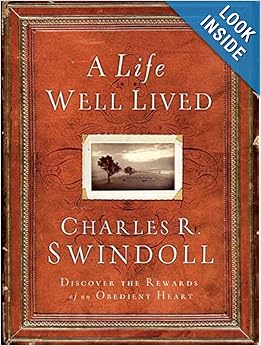 In a similar vein, I enjoyed Charles Swindoll’s A Life Well Lived, a study of Micah 6:8, and Keep A Quiet Heart, by Elisabeth Elliot. Elliot provides a quote from Annie Keary that hits me right between the eyes each time I read it:
In a similar vein, I enjoyed Charles Swindoll’s A Life Well Lived, a study of Micah 6:8, and Keep A Quiet Heart, by Elisabeth Elliot. Elliot provides a quote from Annie Keary that hits me right between the eyes each time I read it:
I think I find most help in trying to look on all the interruptions and hindrances to work that one has planned out for oneself as discipline, trials sent by God to help one against getting selfish over one’s work. Then one can feel that perhaps one’s true work–one’s work for God–consists in doing some trifling haphazard thing that has been thrown into one’s day. It is not a waste of time, as one is tempted to think, it is the most important part of the work of the day–the part one can best offer to God. After such a hindrance, do not rush after the planned work; trust that the time to finish it will be given sometime, and keep a quiet heart about it.
I find that quote very convicting and challenging.
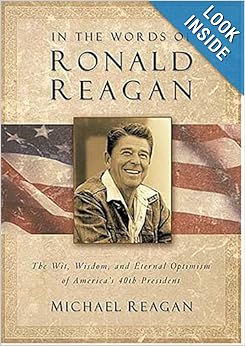 On the political front, I read Michael Reagan’s In the Words of Ronald Reagan. It’s a collection of his dad’s quotes on acting, age, America, the assassination attempt, Communism, Congress, football, horses, jelly beans, freedom, faith, family, and everything else under the sun. It was very refreshing to read such wit, wisdom, and optimism. Similarly I listened to the audio book of The Founding Fathers on Leadership, by Donald Phillips. (Listening to a book still counts, right?) I actually enjoyed it more for its historical retelling of our country’s formation than the leadership lessons.
On the political front, I read Michael Reagan’s In the Words of Ronald Reagan. It’s a collection of his dad’s quotes on acting, age, America, the assassination attempt, Communism, Congress, football, horses, jelly beans, freedom, faith, family, and everything else under the sun. It was very refreshing to read such wit, wisdom, and optimism. Similarly I listened to the audio book of The Founding Fathers on Leadership, by Donald Phillips. (Listening to a book still counts, right?) I actually enjoyed it more for its historical retelling of our country’s formation than the leadership lessons.
In the technical realm I re-read Getting Real, by 37 Signals. Always insightful, it was especially interesting to read it with an eye toward the government workspace.
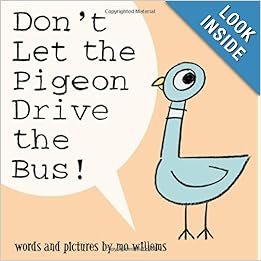 And the list surely isn’t complete without the books I’ve learned from being a father. Two of my favorites are Don’t Let the Pigeon Drive the Bus! by Mo Willems, and The Bear Wants More, by Karma Wilson. Both books are part of a series, all of which amuse me. Given the repetition required when books fall in favor with your toddler, you want to ensure they’re quality books. I assure you these are such books.
And the list surely isn’t complete without the books I’ve learned from being a father. Two of my favorites are Don’t Let the Pigeon Drive the Bus! by Mo Willems, and The Bear Wants More, by Karma Wilson. Both books are part of a series, all of which amuse me. Given the repetition required when books fall in favor with your toddler, you want to ensure they’re quality books. I assure you these are such books.






